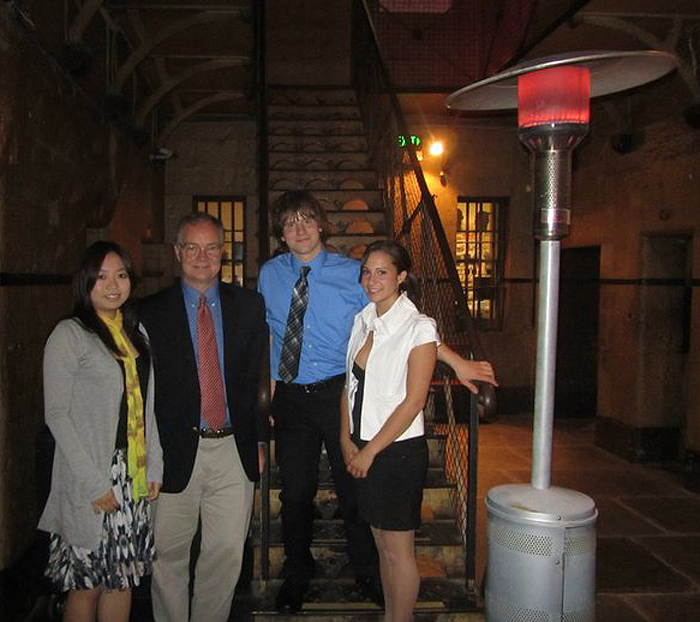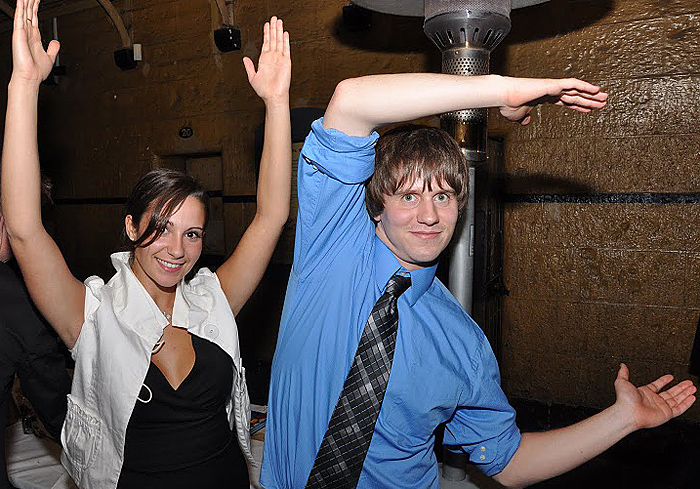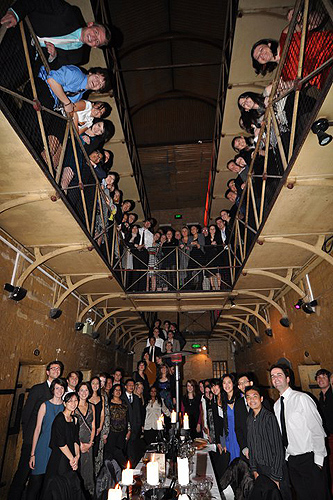
The decision to forego part of their summer vacation in order to ‘talk shop’ at a research conference wasn’t hard to make for three UConn students. The chance to travel to Melbourne, Australia was a major draw, as was the opportunity to mingle with fellow attendees from places as far flung as Hong Kong, British Columbia, Sweden, Mexico, and China.
The approximately 60 undergraduates invited to the conference were from an international network of leading research universities in 15 countries called Universitas 21. UConn was inducted into the organization last April.
Representing UConn at the conference, held in July at the University of Melbourne, were University Scholars Stephanie Davis, Lu Han, and Charles Mackin. They were chosen on the basis of their academic achievements and research interests, and were accompanied by Professor Michael Lynes of Molecular and Cell Biology.
“The conference was done in high style by the organizers,” says Lynes, “and was obviously high on the agenda of the many ‘Uni’ administrators and faculty who joined in at times during the conference. Clearly, this student group – including our own UConn students – was a prized population.”

The conference focused on undergraduate research, and Lynes says the presentations by UConn’s delegation were “very professional and polished, representing the best of our student body.”
Davis, a molecular and cell biology major who is also pursuing a master’s in cell and developmental biology, gave a talk on her research specialty: Bacterial Metallothionein, SmtA, as a Virulence Factor. SmtA is a protein made by bacteria that may influence the mammalian immune response. Davis is exploring the role of SmtA in the bacteria-host interaction, focusing on those properties shared with its mammalian homolog.
Han is a chemical engineering and chemistry double major. She presented a poster on the mathematical modeling of phase separation of a continuous flow biodiesel reactor. She proposes to develop a model with the capacity to represent the behavior controlled by fluid dynamics, phase separation, and reaction kinetics within the biodiesel reactor.
The third student, Mackin, is majoring in structural biology and biophysics and also earning a master’s in genetics. His particular area of interest is quorum sensing and its role in regulating natural competence in Haloarchaea. Archaea are single-celled microorganisms that occupy their own domain of life, separate from bacteria and eukarya. Mackin’s presentation focused on his efforts to find and characterize quorum sensing gens in archaea that may play a role in regulating how these cells communicate among each other.

During the conference, all three UConn students were actively recruited by representatives of other U21 universities seeking to interest them in furthering their education at their institutions.
In addition to talk about current research projects and plans for graduate education, the organizers left plenty of time for the students to experience Australia. On the first night, they participated in a game of Australian Trivia. Davis confesses, “I was awful.” Mackin’s team included an Aussie, and fared somewhat better in the competition.
Group excursions included a trip to an Australian rules football game (according to Lynes, a mix of rugby, soccer, and American-style football), a wildlife retreat featuring native and exotic animals, a trip to a winery, and a closing night celebration held at the Old Melbourne Gaol, made famous as the place where notorious Australian bushranger, the convicted horse thief and folk hero Ned Kelly, spent his final days.
When asked what particularly impressed him about the conference, Mackin said, “It was great to make friends with people from different countries. We’d go out to dinner in a large group and then split up into smaller groups and people wouldn’t just stick with people they knew. It was a great chance to socialize and network.”
Adds Han, “I was surrounded by motivated, committed students and it was a great group of kids overall. From the exchange of ideas, I definitely grew in awareness of international issues … it was an eye-opening experience.”
Next year’s undergraduate research conference will be held at Fudan University in Shanghai, China.


